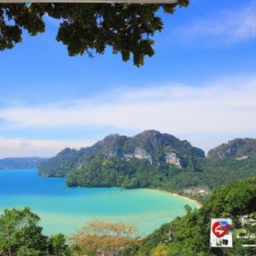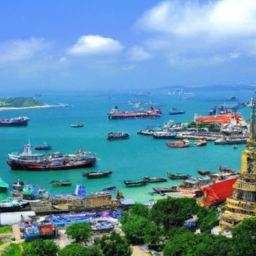
Finding Balance: Navigating Remote Work and Exploration in Southeast Asia
In your quest for Balance between remote work and exploration, Southeast Asia emerges as a captivating region to both satisfy your wanderlust and fulfill your professional obligations. This vibrant corner of the world presents a myriad of opportunities to immerse yourself in diverse cultures, breathtaking landscapes, and delicious cuisines. But how can you navigate the demands of remote work while also indulging in the wonders of Southeast Asia?
Thai Time Management: Balancing Remote Work and Exploration in Southeast Asia
When it comes to striking a harmonious balance between remote work and exploration in Southeast Asia, Thai time management skills can become your trusted ally. With its unique and laid-back approach to life, Thailand offers a welcoming atmosphere that seamlessly blends work and play. Embrace the enchanting tranquility of Thai beaches as your office backdrop or find solace in bustling coffee shops while tackling your daily tasks. The key lies in embracing the Thai ethos of “mai pen rai,” which roughly translates to “no worries.” By adopting this mindset, you’ll discover the art of managing your time effectively while embarking on extraordinary adventures throughout Southeast Asia. So, grab your laptop and embark on a journey that promises to redefine your work-life balance.
Understanding Remote Work and Exploration
In today’s digital age, remote work has become increasingly popular as it offers the opportunity to work from anywhere in the world. It allows individuals to break free from the confines of a traditional office and explore new places while maintaining their professional commitments. Southeast Asia, with its diverse cultures and breathtaking landscapes, has emerged as a favored destination for remote workers seeking both adventure and productivity.
Defining Remote Work
Remote work refers to the practice of working outside of a traditional office setting, often enabled by technology that allows for seamless communication and collaboration. It liberates individuals from the constraints of a fixed location, allowing them to choose their work environment and schedule. Whether it’s working from the comfort of a cozy café or setting up a temporary office in a scenic beachside town in Southeast Asia, remote work provides the flexibility to blend professional responsibilities with personal exploration.
Exploring Southeast Asia as a Travel Destination
Southeast Asia is a region renowned for its captivating landscapes, rich history, and vibrant cultures. From the bustling streets of Bangkok to the serene beaches of Bali, this corner of the world offers an array of travel opportunities. Remote work allows individuals to immerse themselves in the local culture, sample exotic cuisines, and explore historical landmarks while still earning a living. Whether it’s capturing the breathtaking sunrise in Angkor Wat or diving into the turquoise waters of the Philippines, Southeast Asia presents endless possibilities for remote work and exploration.
The Pros and Cons of Remote Work
While remote work offers countless benefits, it also comes with its own set of challenges. It is important to weigh the pros and cons before embarking on this unique lifestyle.
Flexibility and Work-Life Balance
One of the biggest advantages of remote work is the flexibility it provides. You have the freedom to set your own schedule, allowing you to allocate time for work, personal activities, and exploration. Remote work offers the opportunity to find a balance that promotes overall well-being and enhances your productivity.
Isolation and Lack of Social Interaction
Working remotely can sometimes lead to a sense of isolation, particularly when traveling in unfamiliar territories. The absence of face-to-face interactions with colleagues or the routine office environment can leave individuals feeling disconnected. It is essential to actively seek social engagement and build connections with other remote workers or locals to combat feelings of loneliness and stay motivated.
Productivity and Self-Discipline Challenges
Without the structure of a traditional office and the watchful eyes of supervisors, maintaining productivity and self-discipline can become a challenge for remote workers. Distractions in new environments can be abundant, and it takes discipline to stay focused on work tasks. Establishing a routine, managing time effectively, and creating a suitable workspace can help mitigate these challenges and boost productivity.
Preparing for Remote Work and Exploration
Before embarking on a remote work and exploration adventure in Southeast Asia, some essential preparations are necessary to ensure a smooth transition.
Setting up a Suitable Workspace
To maintain productivity and focus, it is important to establish a dedicated workspace that caters to your work needs. Consider factors such as a comfortable chair, proper lighting, and a reliable internet connection. Cafés, co-working spaces, or renting a private office are all viable options depending on your preferences and budget.
Choosing the Right Technology and Tools
Remote work heavily relies on technology, so ensure you have the necessary tools and equipment to perform your tasks efficiently. A reliable laptop, a stable internet connection, and essential software programs are the building blocks of a successful remote work setup. Research and invest in the right tools that suit your needs and ensure seamless communication and collaboration with clients and colleagues.
Researching and Planning Travel Logistics
Exploring Southeast Asia requires careful planning and consideration of travel logistics. Research visa requirements, familiarize yourself with local customs and traditions, and understand any necessary vaccinations or health precautions. Preparing a detailed itinerary, booking accommodations in advance, and making arrangements for transportation can help streamline your travels and minimize stress.
Budgeting for Extended Stays
Traveling and working remotely can be fulfilling, but it’s essential to budget effectively to sustain your lifestyle. Consider accommodation costs, transportation expenses, meals, and other miscellaneous expenditures. Research cost-effective options, such as long-term rentals or co-living spaces, to stretch your budget and maximize your experience.
Maintaining Work Productivity While Exploring
Combining work and exploration in Southeast Asia requires mindful management of time and maintaining a high level of productivity. Here are some strategies to help you navigate the challenges of maintaining productivity while exploring new places.
Establishing a Routine
Even though remote work offers flexibility, establishing a routine is crucial for maintaining productivity. Set specific work hours that align with your peak productivity times, and stick to them as much as possible. Designate focused work blocks, taking breaks when needed, and be consistent with your schedule to optimize your output.
Managing Time Effectively
When exploring new destinations, time can slip away quickly. It’s important to manage your time effectively to balance work commitments and exploration. Prioritize your tasks and create a realistic schedule that accounts for both work and leisure activities. Use productivity tools and techniques, such as time-blocking and prioritization methods, to make the most of your time.
Dealing with Distractions
Working in unfamiliar environments can present distractions that hinder productivity. Identify potential distractions and find strategies to minimize their impact. This could involve using noise-canceling headphones, blocking distracting websites or apps, or finding quiet and secluded workspaces.
Staying Motivated on the Go
Maintaining motivation while working remotely and exploring can be challenging, especially during days when fatigue or wanderlust sets in. To stay motivated, set goals for both work and exploration and reward yourself when you achieve them. Stay connected with other remote workers or join digital communities to share experiences, seek support, and draw inspiration from others pursuing a similar lifestyle.
Embracing Cultural Differences
Embracing the cultural diversity of Southeast Asia is an enriching aspect of remote work and exploration. Understanding and respecting local customs and traditions fosters deeper connections with the places you visit and the people you encounter.
Learning About Local Customs and Traditions
Before arriving in a new country, take the time to learn about the local customs and traditions. This includes familiarizing yourself with appropriate dress codes, greeting customs, and social etiquette. Being aware of and practicing cultural sensitivity demonstrates respect for the local culture and helps forge positive interactions.
Respecting Work-Life Boundaries in Different Cultures
Different cultures have varying attitudes towards work and leisure time. While some may adhere strictly to work hours, others prioritize family and personal time. As a remote worker, understanding and respecting these boundaries is crucial for building positive relationships with clients and colleagues. Adapt your workflow to align with local norms and communicate openly to establish clear expectations.
Overcoming Language Barriers
Communicating effectively is key to success, both in work and exploration. While English is widely spoken in many parts of Southeast Asia, language barriers may still arise in certain areas. Learning a few key phrases or using translation apps can go a long way in overcoming language obstacles and conveying respect for the local language.
Building Relationships with Locals
Engaging with the local community can enhance your overall experience. Seek opportunities to connect with locals through cultural events, language exchanges, or volunteering. Building relationships with locals not only provides valuable insights into the culture but also creates lasting memories and friendships.
Finding Reliable Internet Connections
As a remote worker, a stable internet connection is vital to stay connected with clients, access online resources, and perform your work duties effectively. Ensure you have reliable internet connectivity while exploring Southeast Asia with these strategies.
Researching Internet Availability in Different Regions
Before arriving in a new destination, research the availability and quality of internet connections. Look for information on the speed, reliability, and coverage of local internet service providers. Online forums, travel blogs, and digital nomad communities can provide valuable insights into the internet landscapes of various Southeast Asian countries.
Identifying Co-working Spaces and Cafes with Reliable Connections
Co-working spaces and cafes often provide reliable internet connections tailored to the needs of remote workers. Research and identify reputable establishments that offer conducive work environments and dependable internet access. This ensures you have backup options for connectivity issues and a dedicated workspace if working from your accommodation is not ideal.
Having Backup Options for Connectivity Issues
Despite thorough research and preparation, connectivity issues can occasionally arise. To mitigate the impact of technical difficulties, have backup options available. Carry a portable Wi-Fi device or acquire local SIM cards with data plans to ensure you have a backup connection when needed. Research nearby internet cafés or public libraries that offer free or affordable access to the internet.
Balancing Work Commitments and Exploration
Maintaining a healthy balance between work responsibilities and exploration is a fundamental aspect of the remote work and exploration lifestyle. Here are strategies to help you harmonize both aspects successfully.
Prioritizing Work Responsibilities
Set clear priorities and communicate your availability and deadlines to clients and colleagues. Managing expectations and delivering high-quality work on time establishes reliability and professionalism. Organize your workload and focus on high-priority tasks to ensure you meet your work commitments while still having time to indulge in exploration.
Planning and Scheduling Time for Exploration
To make the most of your Southeast Asia adventure, plan ahead and allocate dedicated time for exploration. Create itineraries that blend work and leisure activities, ensuring you have enough time to explore each destination fully. Factor in travel time, rest days, and any specific sights or experiences you wish to include.
Maintaining a Healthy Work-Life Balance
Remote work can blur the boundaries between work and personal life. It is crucial to establish a healthy work-life balance to avoid burnout and maintain overall well-being. Set aside designated leisure time, engage in activities that bring you joy, and make self-care a priority. Disconnecting from work and immersing yourself fully in the local culture helps rejuvenate your mind and enhances your overall experience.
Avoiding Burnout While Traveling
Traveling can be exhilarating, but it can also be physically and mentally demanding. Take measures to prevent burnout by paying attention to your physical and mental well-being. Get adequate rest, nourish yourself with wholesome meals, exercise regularly, and listen to your body’s needs. Pace yourself and avoid overloading your schedule to prevent exhaustion.
Navigating Time Zone Differences
When working remotely in Southeast Asia, managing communication with clients and colleagues in different time zones is crucial for maintaining effective collaboration. Consider these strategies to navigate time zone differences seamlessly.
Effectively Managing Communication with Clients/Colleagues in Other Time Zones
Establish clear expectations with your clients and colleagues regarding communication methods and response times. Use tools such as email, project management software, or collaboration platforms to maintain efficient communication. Provide regular updates on your availability and take their time zone into account when scheduling meetings or calls.
Adapting Work Schedules to Accommodate Time Differences
Flexibility is key when dealing with time zone differences. Adjust your work schedule to overlap with the working hours of your clients or colleagues as much as possible. This may entail working earlier, later, or dividing your work hours into two segments to accommodate different time zones. Open and transparent communication with all parties involved is essential to ensure smooth collaboration.
Minimizing the Impact of Time Zone Variations on Productivity
Time zone differences can affect productivity, especially if instant collaboration or real-time feedback is required. Implement strategies to minimize the impact of these variations. Break down tasks that require coordination, so that parts can be completed independently. Leverage asynchronous communication methods, such as recorded video messages or shared documents, to maintain progress and reduce dependency on immediate responses.
Dealing with Legal Requirements and Documentation
When working remotely and exploring Southeast Asia, it’s crucial to navigate the legal requirements and ensure you have the necessary documentation to comply with local regulations.
Understanding Visa Regulations in Different Countries
Research the visa regulations of the countries you plan to visit in Southeast Asia. Familiarize yourself with requirements, such as visa types, validity periods, and any associated costs. Consult official government websites or seek guidance from reliable sources to ensure you understand the regulations and can plan your stay accordingly.
Keeping Important Travel and Work Documents Organized
Organize your important travel and work documents to facilitate seamless transitions between destinations. Keep passport copies, visas, travel insurance, and work-related documentation in secure digital or physical folders. Maintain backups of digital files in cloud storage to avoid potential loss or damage.
Navigating Tax Implications of Remote Work While Abroad
Working remotely while in Southeast Asia can have tax implications, both for your home country and the countries you visit. Research the tax regulations and laws related to remote work to understand your obligations and rights. Consult professional tax advisors to ensure compliance with legal requirements and optimize your financial situation.
Conclusion: A Balanced and Fulfilling Lifestyle
Combining remote work and exploration in Southeast Asia offers a unique lifestyle that fosters personal growth, cultural immersion, and professional development. By understanding the benefits and challenges, preparing adequately, maintaining productivity, embracing cultural differences, and navigating logistical and legal considerations, you can create a balanced and fulfilling experience. Remote work allows you to break free from conventional constraints and embark on a journey where work and exploration harmoniously coexist. Embrace the opportunities Southeast Asia offers, and seize the chance to create cherished memories, broaden your horizons, and lead a life filled with adventure, discovery, and personal fulfillment.
Reflecting on the Benefits of Combining Remote Work and Exploration
The experience of combining remote work and exploration in Southeast Asia brings numerous benefits. It allows you to earn a living while experiencing the wonders of different cultures, diverse landscapes, and memorable adventures. This lifestyle combines the freedom to work independently with the joy of exploration, resulting in personal growth, enhanced creativity, and a broader perspective of the world.
Tips for Finding Harmony and Maximizing the Experience
To find harmony and maximize the remote work and exploration experience, establish a strong support network of like-minded remote workers, join local communities, and engage in cultural activities. Prioritize self-care, create a healthy work-life balance, and approach challenges with flexibility and curiosity. Embrace the unexpected, stay open-minded, and allow yourself to adapt to new surroundings. By striking a balance between work commitments and exploration, you can create a meaningful and rewarding lifestyle that brings fulfillment and joy.
The Future of Remote Work and Travel
The future of remote work and travel holds immense potential. As technology continues to advance and global connectivity improves, the opportunities for remote work and exploration will only expand. More individuals are embracing the freedom and flexibility that remote work offers, and Southeast Asia remains an attractive destination for those seeking a blend of adventure and professional growth. With the ability to contribute to a global workforce while exploring exotic destinations, the future of remote work and travel promises an exciting and fulfilling lifestyle for those willing to embrace it.
Finding Balance: Navigating Remote Work and Exploration in Southeast Asia
“Thai Time Management: Balancing Remote Work and Exploration in Southeast Asia.”






